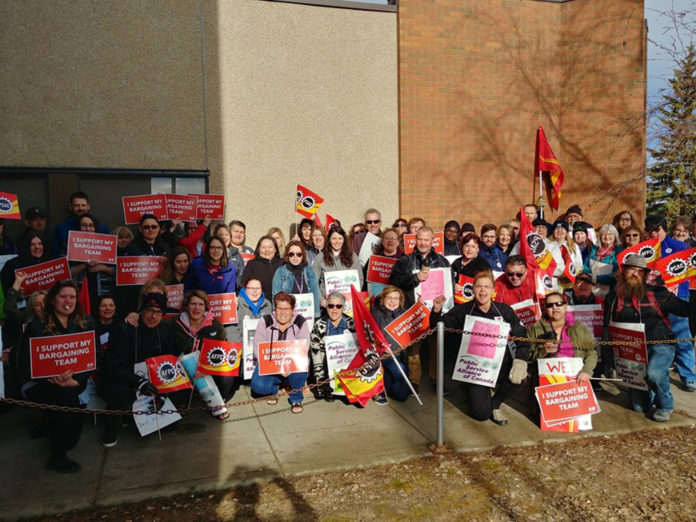
Public Service Alliance of Canada (PSAC) members aren’t happy that the federal government hasn’t solved the Phoenix Pay System problems yet, and now it’s starting to affect collective bargaining.
The Union, which represents more than 21,000 workers on the prairies alone, held a rally in front of the John E. Diefenbaker Building on Thursday morning to show their displeasure with slow developments, and solidarity with their bargaining committee.
PSAC prairie region executive vice-president Marianne Hladun said government workers have put up with a lot of uncertainty over the last four years, and it’s time for the federal government to acknowledge that at the bargaining table.
“The government has struggled to pay their own employees—and continues to struggle—and (it will take) five to 10 years to get that resolved,” Hladun said. “The wage offers that we’ve had have not met the cost of living and so we’re saying do you value the work we do? That is a primary issue.”
The next round of negotiations with the Treasury Board is scheduled to begin on April 30, however, PSAC also has negotiations planned with the Canada Revenue Agency, Parks Canada, the Canadian Food Inspection Agency and the Canadian Border Services Agency. Ideally, the PSAC would like negotiations completed before campaigning starts for the 2019 federal election.
Hladun said that while government’s proposed wage increase would not even cover the rising cost of living, but there are other areas of concern. Those areas include granting leave for employees suffering from domestic violence, and providing allowances for dangerous work that members perform. However, the biggest issue continues to be the Phoenix Pay System.
The federal government has floated the idea of creating a whole new pay system, however the PSAC doesn’t believe it will be up and working for at least five years. They’re also not confident the government is taking the matter as seriously as they should.
“Do I believe they feel the same sense of urgency as our members do? No, I don’t,” Hladun said. “While work continues, I would like to see more resources put where they need to be.”
Hladun added that the issue should concern all Canadians because as long as employees aren’t being paid, they aren’t spending money in the community.
“Employees do not want to spend that money because you do not know what’s going to happen next week,” she said.
Questions sent to Public Services and Procurement Canada, which is overseeing correction to the Phoenix Pay System, where not returned by print time.
Since the Phoenix Pay System began failing, PSPC has increased processing capacity by setting up satellite offices in Gatineau, Montreal, Winnipeg, Shawinigan and Kingston. It also hired 300 additional compensation advisors to increase capacity. According to updates on the PSPC website, there are roughly 1,500 staff working in pay centres around the country. The PSPC has also set up a number of working groups and committees to provide oversight and track performance.
In total, 8 of the 23 measures taken to stabilize the pay system are listed as either “completed” or “in place.” The others are listed as either “ongoing” or have estimated delivery dates for various points in 2018.

